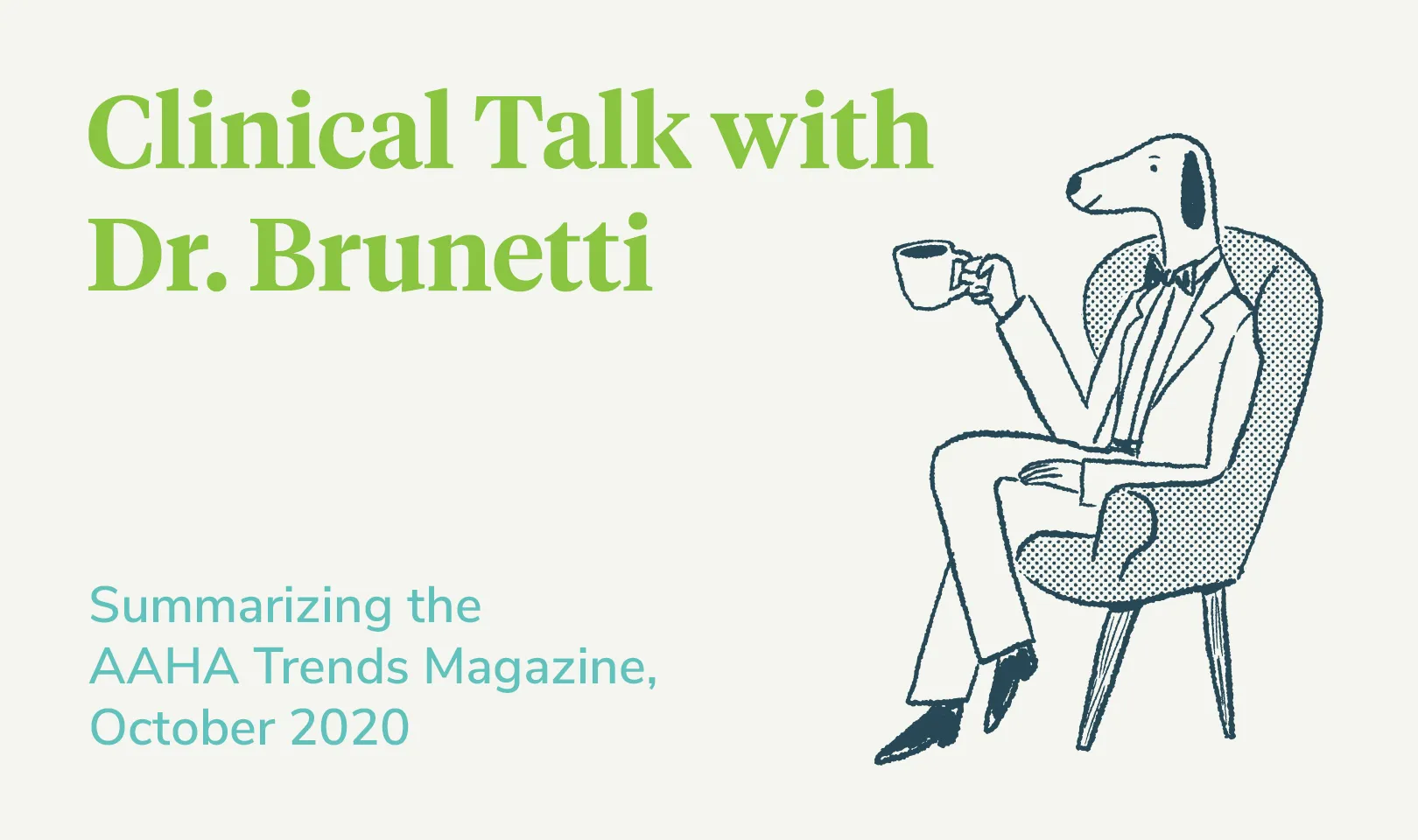Clinical Talk: October Trends


As vets, we know how important it is to stay up-to-date on new clinical developments, protocols, and strategies. It’s also, sometimes, impossible, especially when you’re working long shifts. Unread stack of academic journals cluttering your night stand? We’ve been there.
IndeVets is here to help you stay informed. Our Chief Medical Officer, Dr. Marisa Brunetti, reads each issue of AAHA Trends Magazine, JAVMA, & Clinician’s Brief cover to cover, and summarizes key research. Today, she provides summaries of the October issue of AAHA Trends Magazine.
Introduction
2020 is coming to a close — what?! The weather is getting chilly here in Philadelphia and it’s getting darker earlier. It’s getting closer to the season when pets accidentally eat candy, cookies, and Thanksgiving leftovers. October is one of my favorite months, both personally and professionally. In October, as a profession, we celebrate veterinary technicians! We couldn’t do our jobs without them, and though Vet Tech Week is only one week in October, we should be celebrating our partners in animal health every day. In this issue of AAHA Trends, I was excited to see information on two important topics — our veterinary technicians and their well-being in the time of COVID-19 and a review of the new AAHA/AAFP Feline Vaccination Recommendations. But first, some news:
News
Global Animal Hospital Report on COVID impact
This report was conducted by the Business Research Company and showed the global animal hospital and veterinary clinical market had a value of nearly $91.3 billion in 2019 with an expected decline to $70.7 billion in 2020. This decline is mainly due to the pandemic and efforts to contain it. The good news though — the market is expected to rebound and reach over $111 billion in 2023.
Hookworm infections are increasing across the US
The Companion Animal Parasite Council (CAPC) recent study shows a 47% increase in the number of canine hookworm cases in the US from 2012-2018. CAPC issues a Top 10 Cities Monthly Hookworm report — check it out here.
AAHA/AAFP’s Updated Feline Vaccination Guidelines
As always, it is important to read these guidelines in their entirety. These guidelines update the 2013 AAFP Feline Vaccination Advisory Panel Report and have similar recommendations to the 2016 WSAVA Guidelines for the Vaccination of Dogs and Cats. For all things feline vaccination, check out www.aaha.org/felinevaccination or www.catvets.com/vaccination for AAFP’s disease information fact sheets. AAHA Trends broke these trends down into a more manageable dose of information, but I will break it down even further for a quick look at this new resource:
Not new, but still important
- There is no single protocol suitable for all feline patients.
- Core vaccines are always recommended, and noncore vaccines are discretionary.
- Types of feline vaccines: inactivated, attenuated, and recombinant.
- Adverse vaccine reactions still occur in a small number of cats — of which the most important is still feline injection-site sarcomas (FISSs) — client education is important!
- The 3-2-1 rule for monitoring the vaccination site for swelling or lumps is still in effect.
New, check this out…
- This is not a new concept but should be occurring more: Designate a person to be the primary vaccine coordinator for your hospital. Leverage your staff’s knowledge to continually educate other staff members and clients about their pets’ vaccines.
- One important change for kittens: AAHA/AAFP recommends revaccinating kittens against feline panleukopenia/herpesvirus type 1/calicivirus at 6 months of age to potentially decrease the risk of maternally derived antibodies interfering with immunization.
- There is a new online, individualized, lifestyle-based vaccine calculator that can be found here. This plan should be reassessed yearly or when changes to health or lifestyle occur.
- There is a comprehensive section with updates on FISSs. Unfortunately, much remains unknown about these sarcomas, but vaccine sites in the distal limbs and tail continue to be recommended.

Vet Tech Week was last week: October 11–17
Last week was Veterinary Technician Week. As we reflect on these celebrations, especially in the time of COVID-19, we must realize that we can’t perform our jobs without our support staff. Our techs have been leveraged even more during the pandemic and now part of their job involves even more physical activity to get our patients to and from the hospital safely and to take care of clients during curbside appointments.
On the other hand, we all know how difficult it can be to find experienced, credentialed technicians because there is a shortage of licensed technicians throughout our profession. The Veterinary Nurse Initiative (check it out at https://veterinarynurse.org/) states that technicians leave our profession for many reasons, but that lack of respect from the public and veterinary professionals, low wages, lack of utilization of their skills, compassion fatigue, and burnout are the most common reasons. We can do more to support our technical staff’s wellbeing and job satisfaction.
An article in Trends highlights the additional mental health struggles that our technical staff is feeling during the pandemic. Aside from the very real and important personal stressors during the pandemic, work challenges for our support staff include fewer teammates, increased daily patients, PPE shortages, changes in or loss of work hours, clients with limited financial resources, the inefficiency of curbside appointments, and concerns about giving or getting COVID-19.
Most of the technicians interviewed for this article indicated they had some mental health struggles prior to the pandemic. Those with pre-existing struggles feel worse, and those with no pre-existing issues are developing them. Technicians are having problems with mood, energy, sleep, and concentration, as well as experiencing increased burnout and compassion fatigue. Seventy-seven percent of respondents reported new or increased anxiety.
We hear it all the time, but self-reflection and self-care are so important. In this profession, we say we know that and then we don’t heed the advice of professionals. We need to focus on activities that support general well-being and obtain help from a professional counselor if needed. As a profession, we should continue to be open and transparent about the struggles we are feeling, especially during the pandemic. Providing support to a colleague, if you are able, can go a long way.
Dr. Brunetti is Chief Medical Officer at IndeVets.
